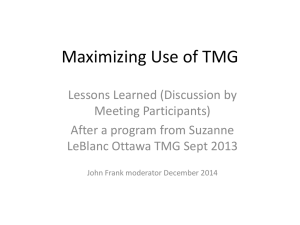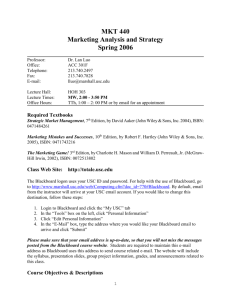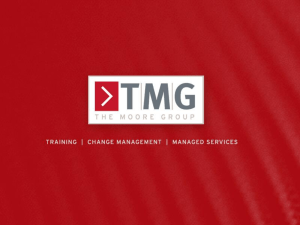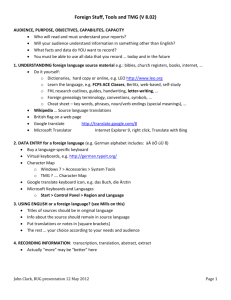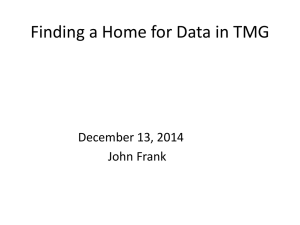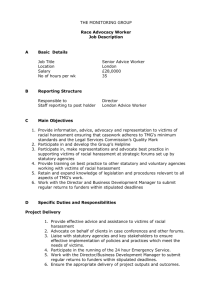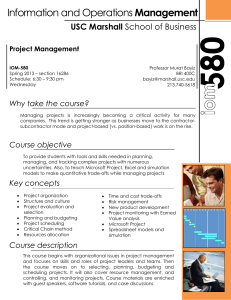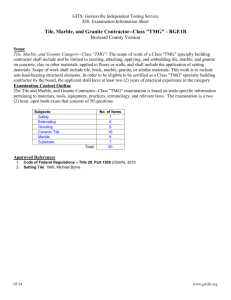MKT 440 - USC Marshall Current Students
advertisement
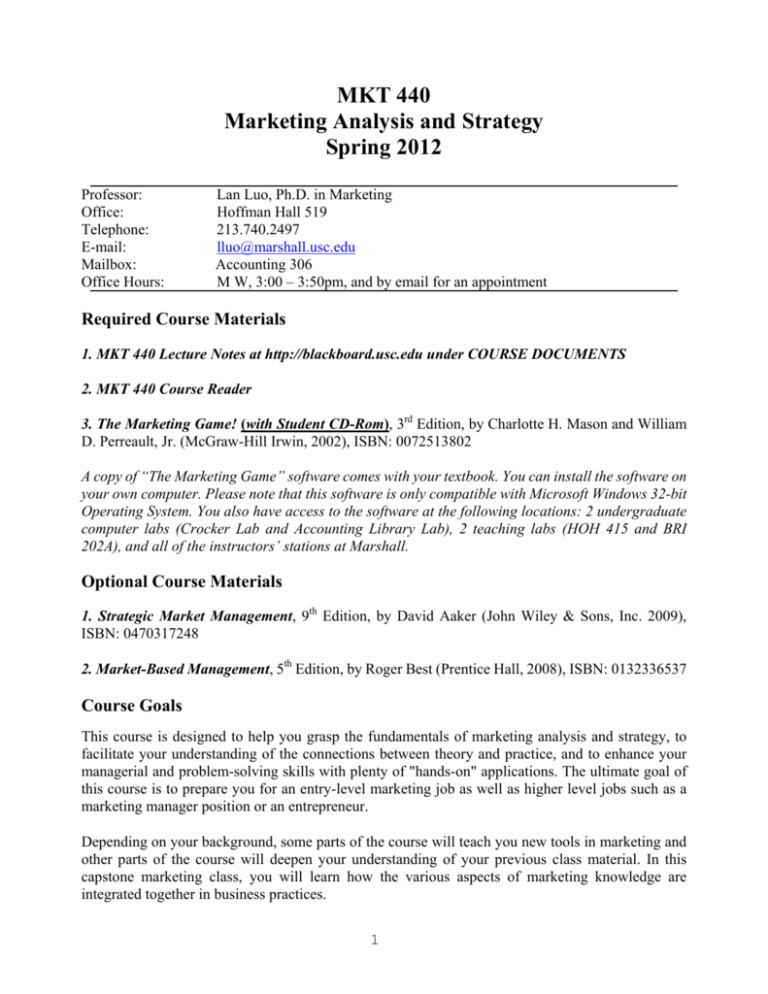
MKT 440 Marketing Analysis and Strategy Spring 2012 Professor: Office: Telephone: E-mail: Mailbox: Office Hours: Lan Luo, Ph.D. in Marketing Hoffman Hall 519 213.740.2497 lluo@marshall.usc.edu Accounting 306 M W, 3:00 – 3:50pm, and by email for an appointment Required Course Materials 1. MKT 440 Lecture Notes at http://blackboard.usc.edu under COURSE DOCUMENTS 2. MKT 440 Course Reader 3. The Marketing Game! (with Student CD-Rom), 3rd Edition, by Charlotte H. Mason and William D. Perreault, Jr. (McGraw-Hill Irwin, 2002), ISBN: 0072513802 A copy of “The Marketing Game” software comes with your textbook. You can install the software on your own computer. Please note that this software is only compatible with Microsoft Windows 32-bit Operating System. You also have access to the software at the following locations: 2 undergraduate computer labs (Crocker Lab and Accounting Library Lab), 2 teaching labs (HOH 415 and BRI 202A), and all of the instructors’ stations at Marshall. Optional Course Materials 1. Strategic Market Management, 9th Edition, by David Aaker (John Wiley & Sons, Inc. 2009), ISBN: 0470317248 2. Market-Based Management, 5th Edition, by Roger Best (Prentice Hall, 2008), ISBN: 0132336537 Course Goals This course is designed to help you grasp the fundamentals of marketing analysis and strategy, to facilitate your understanding of the connections between theory and practice, and to enhance your managerial and problem-solving skills with plenty of "hands-on" applications. The ultimate goal of this course is to prepare you for an entry-level marketing job as well as higher level jobs such as a marketing manager position or an entrepreneur. Depending on your background, some parts of the course will teach you new tools in marketing and other parts of the course will deepen your understanding of your previous class material. In this capstone marketing class, you will learn how the various aspects of marketing knowledge are integrated together in business practices. 1 Learning Objectives I have organized this course in the context of three learning themes to achieve these goals: 1. Grasp the Discipline of Marketing Analysis and Strategy: One important goal of this course is to help you establish a solid foundation in marketing analysis and strategy. Students will learn how to conduct external and internal analyses that support an integrated development of a marketing plan, and how to identify and address various strategic questions such as strategic options, branding, and growth. 2. Develop Abilities to Conduct In-Depth Analyses of Real-World Situations: Over the course of the semester, students will have plenty of opportunities to apply the knowledge they gain from this course to real-world business situations in a wide range of industries. Students will learn to carry out in-depth analyses of various marketing cases so that they can develop a set of analytical and qualitative tools to better understand the successes and mistakes of marketing practices. 3. Sharpen Problem-Solving and Managerial Skills: A significant part of the course involves "The Marketing Game." The game is a computer simulation in which you and your fellow teammates will be the marketing managers of your own firm for the semester. Students can apply their knowledge of marketing management to make important decisions such as: Select target segments Product positioning Price and cost dynamics Market evolution and dynamics Competitive analysis Resource allocation In addition, students will learn to conduct primary and secondary marketing research in practical settings. Students are also required to participate in oral discussions, board meetings, and case presentations to improve their communication skills. Have some fun! I believe in the philosophy that enjoyable learning is the most effective way to learn. I will work to stimulate your interest and learning, but you are expected to display initiative and a program of self-study. In that sense, a complementary objective of this course is to provide you with an environment that will encourage and reward your own intellectual effort, while simultaneously maintaining rigorous standards that identify those who are motivated to pursue excellence in their own educational preparation for a successful career. 2 Preparing For Class It is required that you read the assigned cases before each class and think about how to apply the materials for class discussion. These assigned readings will help you to reinforce the knowledge you have learned from the lectures and will enable you to participate in class discussions productively. It is also required that you read the assigned chapters from “The Marketing Game” book before class. Occasionally we will need to use calculator for some in-class exercises. You should bring a calculator to all classes. A calculator with basic functions will be sufficient. Formal Course Assessment Exam 1 (closed book) Exam 2 (not cumulative, closed book) Individual Case Write-Ups (5 required) Marketing Case Presentation (team) The Marketing Game! (team) Written Report 5% Oral Report 5% Performance 10% Class Participation and Attendance 25% 25% 10% 10% 20% 10% Grading Policy 1. Exam 1: a closed book, closed notes exam consisting multiple choice questions, true/false question, and short-answer questions. 2. Exam 2 (final): not cumulative, exam format similar to exam 1. 3. Individual Case Write-Ups: We will discuss 10 cases from the MKT 440 Course Reader. You are required to submit a brief write-up for 5 out of 10 cases. These write-ups will help you apply the materials learned from this class to real-world situations. The questions for each case will be provided by the instructor in advance. More details will be given in a separate handout. I will not accept late write-ups as you should answer the questions before we discuss the case in class. If you happen to miss a class, you will not be affected as you only need to provide write-ups for 5 out of 10 cases. I will return the case write-ups after I grade them. Unclaimed case write-ups will be disregarded after 2 weeks. 4. Marketing Case Presentation (team): The purpose of this presentation is to provide each student group with an opportunity to conduct an in-depth analysis of a marketing case. Your group will conduct some primary and/or secondary research and make some strategic recommendations for the company in your case. More details will be given later. 5. The Marketing Game (team): See Appendix A of this syllabus for more details. 3 6. Class Participation and Attendance: This course is intended to be an active learning experience. Your learning is greatly enhanced by actively being a part of each lecture. The grading of class participation/attendance will be determined by the following components: 1) participation during each lecture; 2) class attendance; 3) homework assignments; 4) your individual performance in the board meetings; and 5) your student conduct in the classroom. I realize that occasionally it is not possible to attend class. It is your responsibility to get all the notes and handouts for the class you miss. You do not need to notify me if you cannot make it to class unless it’s a day of exam, presentation, or board meeting, or if you are not able to attend for an extended period of time. You can miss up to three class sessions without it affecting your grade. However, if you miss more than three sessions, it could have an impact on your class participation and attendance grade. Exam Policies The grades of Exam 1 will be posted on Blackboard. Any questions or appeals about the exam must be made in writing via e-mail within 7 days after the grade is posted. Make-up exams will only be permitted as required by University Policy. Therefore, you must have a University approved excuse (e.g., Doctor’s excuse or University sponsored event) and provide the instructor with the supporting document. You must notify me within 24 hours of the scheduled exam to explain why you missed or will miss the exam and to reschedule a make-up. Course Conduct There are certain rules that I hope will help all of us to have a good experience in the classroom. Don’t be late or leave early, otherwise we will all feel like we are at the airport – not a place conducive to learning. When you come to class, be prepared to participate actively. This is not the place to sleep, chat with your friends, read the newspaper, text messaging, etc. There are more comfortable places for those activities than this classroom. No laptop in classroom, unless special permission from the instructor. No food in the classroom. No cell phones, iPods, or other electronic devices in the classroom. Violation of course conduct will considerably affect your class participation grade. 4 Team Assignments You have 2 team assignments in this class. You will work with the same team on both assignments. Students should form groups and have the names of the group members submitted to me by the end of the class on Monday, Jan. 24. Each group should consist of 4-5 students (depending on the class size in your particular section, the instructor will provide more details on this). Please note that The Marketing Game requires exactly 8 (or 4) groups in each class. Depending on the class size, I may have to make minor adjustments in the group formation. It is recommended that at least one member in each student group has a laptop with the TMG software installed and can bring the laptop to school when you are given class time to play the game. Remember that the laptop needs to have a 32-bit Windows operating system. You may also use the public computers at Marshall during your group meetings. At some point in your careers, you will be asked to evaluate the work of others. So as part of the team assignment experience, you will be required to submit a peer evaluation form (Appendix C of this syllabus) for your team assignments. Failure to make equitable contributions to group work will be penalized with lower individual grade. Student Information Sheet To facilitate my knowledge of each student so that I can accurately evaluate your class participation, I would like to obtain a student information sheet from you. This sheet will be distributed in class. Feedback to the Instructor At the Marshall School of Business, we are committed to continuous improvement in the quality of teaching and learning. Please feel free to speak to me at any time regarding any aspect of this course, including things that you think are going well, or things that need to be improved. During the semester, I will also give you several opportunities to submit written feedback to me anonymously. These will help me gauge how the course is progressing and make it a worthwhile experience for you. Class Web Site: http://blackboard.usc.edu The Blackboard login uses your USC ID and password. The website will include the syllabus, lecture notes, group project information, grades, and announcements related to this class, etc. By default, email from the instructor will arrive at your USC email account. Students are required to maintain this e-mail address as Blackboard uses this address to send course related e-mail. Please make sure that you check this email account on a regular basis so that you will not miss the messages posted from the Blackboard course website. 5 Schedule A tentative schedule is presented below. The syllabus schedule and contents are subject to revision at the instructor’s discretion. Additional readings may be provided by the instructor. The dates for the written assignments, board meetings, oral presentations, exams, and term paper will not change. Date 1/9 M Subject TMG Submit Introduction 1/11 W Overview of Business Strategy: The Concept and Trends Case #1: IKEA 1/16 M MLK Day 1/18 W Customer Analysis 1/23 M Business Librarian Seminar 10am and 4pm sections: BRI 202A 12pm section: HOH 415 1/25 W Case #2: New Century Brewing Competitor Analysis 1/30 M Product Analysis 2/1 W Overview: The Marketing Game Groups meet to get familiar with TMG – bring laptop 2/6 M First Board Meeting 2/8 W First Board Meeting 2/13 M Case #3: Best Buy vs. Amazon Pricing Analysis 2/15 W Case #4: Starbucks Instant Coffee, Kleenex’s New Tissue 2/20 M President’s Day 2/22 W Case #5: Culinarian Cookware Groups meet to work on TMG (period 2) – bring laptop 2/27 M Strategic Partnerships Review for Exam 1 2/29 W Case #6: Burger King – Paramount Deal; Amazon – Toys R Us Partnership Groups meet to work on TMG (period 3) – bring laptop 3/5 M Level 2 of TMG Groups meet to work on Level 2 of TMG 3/7 W Exam 1 3/12 M 3/14 W Spring Break (Have fun!) Spring Break (Have fun!) Group List Due Ch. 1,2,3,4,6 TMG Decision (Period 1) TMG Decision (Period 2) Ch. 5 6 TMG Decision (Period 3) Date 3/19 M Subject Second Board Meeting Groups in other industries meet to work on TMG (Period 4) – bring laptop 3/21 W Second Board Meeting Groups in other industries meet to work on TMG (Period 4) – bring laptop 3/26 M Value and Innovation 3/28 W Global Strategies Groups meet to work on TMG (Period 5) – bring laptop 4/2 M Case #7: Web Sitcom; Jaguar Case #8: Luxury Goods for the Chinese 4/4 W Branding Strategies Groups meet to work on TMG (Period 6) – bring laptop 4/9 M Case #9: Luxury Brand Extension; Unite Toothbrush, Toothpaste Growth Strategies 4/11 W Case #10: Toys R Us Review for Exam 2 4/16 M TMG Presentations Team Evaluation Due 4/18 W TMG Presentations Team Evaluation Due 4/23 M Guest Speaker 4/25 W Exam 2 5/2 W TMG Submit TMG Decision (Period 4) TMG Decision (Period 5) TMG Decision (Period 6) Submit TMG Written Report (Group) Celebrate! Good luck! Please drop me a line wherever you end up! 7 APPENDIX A: THE MARKETING GAME A significant part of the course involves THE MARKETING GAME! – a simulation in which teams of students manage firms that compete with one another in a given industry. This project will give you a "hands-on" opportunity to analyze markets, competitive forces, and target market needs. You will also get lots of practice in forecasting and budgeting. Your group will compete against three other groups in your class. Every team starts out with the same amount of money and the same market share. It is up to you to develop and implement your strategies. If you are successful, your firm can make a lot of money. On the other hand, depending on what your competitors do, your firm can also lose a great deal of money. But don't get discouraged! You will have six opportunities in the semester to make your decisions. Just like in the "real world," some years are better than others. The Marketing Game (TMG) book provides the details you need to know in order to play the game. Like all simulations, TMG is subject to some limitations. However, these limitations are not unlike the limitations that exist in many industries. For example, the FCC regulates (and sells) the broadcast spectrum, Microsoft Windows has become the dominant operating system for personal computers, and the Robinson-Patman Act prevents manufacturers from charging similar types of retailers different prices for identical products. I will give you more details about the particular limitations of TMG later on in the semester. All of your competitors face exactly the same limitations as you do. Just accept the limitations of TMG as yet another form of the external constraints faced by every business in all industries. My experience is that the students who thoroughly read and study the information presented in the book get off to a good start and in the long run tend to do better. Groups that work the best together tend to do the best (as well as have the most fun). Thus, you are strongly encouraged to work closely with your group members. As you will see when you read the book, this game has three levels of difficulty. We will only play level 1 and level 2 of the game in this class. We will increase the difficulty to level 2 at period four. Wednesdays you will be given class time to meet with your group. I will be available for consultation. You need to email me (lluo@marshall.usc.edu) an electronic version of your decision file by the following Monday before the beginning of the class. The specific submission dates are given in the schedule above. The instructor will send your team’s performance report via email by Wednesday class. In order to run the simulation, I need to have every team's decision. If your team fails to turn your work in on time, I will use your previous week's decision again. (Note, since your competitors are modifying their plans, using your old plans can be very costly!) Just as in the "real world," the more money you make, the more money you will have to work with in the next period. Each group will have two private board meetings with me. The first board meeting is scheduled before period 1 of the game. At this meeting, each group will explain to me the overall objective of your firm and how you plan to achieve this objective. After three periods, your group will have a second board meeting with me. At this meeting, you need to submit a written report summarizing your strategies to date and discussing your future plans. At the end of the game, each group will make an oral presentation to the class and submit a final written report. Guidelines for preparing for the board meetings and formulating the written and oral reports will be provided in separate handouts. A commonly asked question is "How do you grade the game?" I believe that the ultimate goal of this game is to help you make better decisions in real life. Therefore, both the outcome and the process matter. Your firm's performance (e.g. profitability, market share) throughout the semester, the written report, and the oral presentation will all factor into your marketing game grade. Your grades on the written reports and oral presentation will be independent of how well your firm performs. Instead, I will emphasize on things like the logic behind your decisions and your learning experiences. 8 APPENDIX B: MARSHALL GUIDELINES Add/Drop Process In compliance with USC and Marshall’s policies classes are open enrollment (R-clearance) through the first week of class. All classes are closed (switched to D-clearance) at the end of the first week. This policy minimizes the complexity of the registration process for students by standardizing across classes. I can drop you from my class if you don’t attend the first two sessions. Please note: If you decide to drop, or if you choose not to attend the first two sessions and are dropped, you risk being not being able to add to another section this semester, since they might reach capacity. You can only add a class after the first week of classes if you receive approval from the instructor. Further, if you are absent from the first three weeks of classes, I will ask you to withdraw by 1/27. These policies maintain professionalism and ensure a system that is fair to all students. Students with Disabilities Any student requesting academic accommodations based on a disability is required to register with Disability Services and Programs (DSP) each semester. A letter of verification for approved accommodations can be obtained from DSP. Please be sure the letter is delivered to me (or to TA) as early in the semester as possible. DSP is located in STU 301 and is open 8:30 a.m.–5:00 p.m., Monday through Friday. The phone number for DSP is (213) 740-0776. Academic Integrity USC seeks to maintain an optimal learning environment. General principles of academic honesty include the concept of respect for the intellectual property of others, the expectation that individual work will be submitted unless otherwise allowed by an instructor, and the obligations both to protect one’s own academic work from misuse by others as well as to avoid using another’s work as one’s own. All students are expected to understand and abide by these principles. SCampus, the Student Guidebook, contains the Student Conduct Code in Section 11.00, while the recommended sanctions are located in Appendix A. http://www.usc.edu/dept/publications/SCAMPUS/gov/ Students will be referred to the Office of Student Judicial Affairs and Community Standards for further review, should there be any suspicion of academic dishonesty. The Review process can be found at: http://www.usc.edu/student-affairs/SJACS/ Failure to adhere to the academic conduct standards set forth by these guidelines and our programs will not be tolerated by the USC Marshall community and can lead to dismissal. Emergency Preparedness/Course Continuity In case of emergency, and travel to campus is difficult, USC executive leadership will announce an electronic way for instructors to teach students in their residence halls or homes using a combination of Blackboard, teleconferencing, and other technologies. Instructors should be prepared to assign students a "Plan B" project that can be completed at a distance. For additional information about maintaining your classes in an emergency please access: http://cst.usc.edu/services/emergencyprep.html Please activate your course in Blackboard with access to the course syllabus. Whether or not you use Blackboard regularly, these preparations will be crucial in an emergency. USC's Blackboard learning management system and support information is available at blackboard.usc.edu. 9 APPENDIX C: PEER EVALUATION FORM MKT 440 Marketing Analysis and Strategy Instructor: Lan Luo Your name _______________________________ Use this form to evaluate yourself and your team members on the listed criteria: 1. Attended all meetings - was there on time and ready to work for every meeting. 2. Completed all tasks - tasks were finished when promised and were done well. 3. Contributed to group effort - volunteered for work, assisted teammates when needed, and did his/her fair share. 4. Contributed to group process - helped keep meetings on track, did not stray from subject, and settled conflict. Team Member Points ___Yourself______________________ _______ _________________________________ _______ _________________________________ _______ _________________________________ _______ _________________________________ _______ TOTAL = 100 Points Specific comments about the group effort on the project: ________________________________________________________________________________ ________________________________________________________________________________ __________________________________________________________________________ _____________________________________________________________________________ ______________________________________________________________________________ ______________________________________________________________________________ ______________________________________________________________________________ ______________________________________________________________________________ 10
